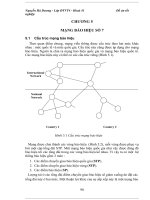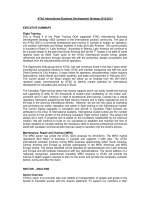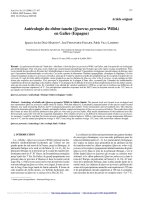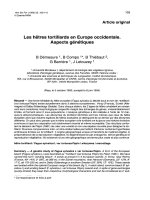5. International Business (En) Hkt8.2023.Docx
Bạn đang xem bản rút gọn của tài liệu. Xem và tải ngay bản đầy đủ của tài liệu tại đây (117.78 KB, 6 trang )
MINISTRY OF EDUCATION AND TRAINING
THE SOCIALIST REPUBLIC OF VIETNAM
UNIVERSITY OF ECONOMICS HCMC
Independence-Freedom-Happiness
HIGHER EDUCATION PROGRAM
MAJOR: International Business
MINOR: International Business/ Foreign Trade
SYLLABUS
1. Course title: International Business Management
2. Course code: ……………………………………………………….
3. Teaching Department: International Business and Marketing
4. Level of competency: Undergraduate – 2nd year
…………………………………………………………………………………….
5. Credits: 3
6. Time allocation:
+ Lecture:
25
+ Group works, practice, discussion:
15
+ Self-study:
5
7. Prequisite courses: none
8. Course description:
International Business course introduces the international business environment and the
fundamental issues in international business management. The main topics of the course
include: Introduction of globalisation; international business enviornment audit and national
diferences; international trade and investment theories and policies, international business
strategies, market entry modes, and functional strategies in organisation.
1
9. Learning materials:
9.1 Text books:
Material 1: Hill (2018) Global Business Today (10e) Mc GrawHill
Material 2: Cavusgil, S. T., Knight, G., & Riesenberger, J. R. (2019). International
Business: The New Realities.
9.2 Referrences:
Material 1: Deresky, H. (2014). International Management (9e) Pearson
9.3 Others:
……………………………………………………………………………………….
2
10. Course teaching plan:
Dates
Topic
Students’
preparation
Week 1
Welcome
Course introduction
Group formation
Topic: Globalization
- Concepts of globalization
Week 2
-
Drivers of globalization
-
Key changes in the global economy
-
Impact of globalization on business
Topic 2: National differences in political economy
- National differences in political, economic, and legal
environment
-
Week 3
Week 4
Read chapter 1
Read chapter 2
Why is understanding national differences vital to
international business?
Topic 3: Economic development and political economy
- Determinants of economic development
-
How the political economy can affect economic
development
-
Key information in understanding the business
environment of an international market.
Topic: National differences in culture
- Key concepts of culture
-
Determinants of Culture
-
Impact of Culture on business
Read chapter 3
Read chapter 4
Discussion:
1. Outline why the culture of a country might influence
the costs of doing business in that country. Illustrate
your answer with examples.
2. Why do you think cultural intelligence is important
(irrelevant) in international business?
Week 5
Topic: Trade theories
Read chapter 6
3
Week 6
-
Mercantilism
-
Theory of Absolute Advantage
-
Theory of Comparative Advantage
-
The New Trade Theory
-
The National Competitive Advantage (Porter’s
Diamond)
Topic: Government Policy and International Trade
- Trade tools
-
Read chapter 7
Impact on trade tools
Discussion
- What are trade barriers? Why do they exist?
Week 7
What impacts do trade barriers have on international
business?
Topic: Foreign Direct Investment
- Key concepts of FDI
-
Read Chapter
8
FDI policies
Discussion:
Week 8
LMS self-study and Topic Quizzes
Review
Group research and report, midnight Sunday, end of week 8, LMS
Week 9
Group presentation
11. Student assessment system:
Assignment
Type
Weigh
t
#1 Attendance and
Participation
Individual
10%
#2 Topic quizzes
Individual
15%
#3 Group tasks
Group
10%
#4 Group presentation
Group
15%
#6 Final exam
Individual
50%
4
12. Student duties:
To successfully complete this unit, students must:
Achieve a minimum of 50 marks;
Complete all assessment items; and
Attend 80 per cent of class time.
1.
Attendance and in-class discussion: This is a discussion-based course,
your participation is important to the learning experience. Participation includes
coming to class prepared and on time, taking part in class discussions (this involves
listening/reading as well as writing/speaking and completing all in-class activities),
asking questions, contributing your knowledge and insights in whatever form is
appropriate, and striving to make all your contributions excellent. Much of the
learning in this course will come from the chance to express your ideas and
exchange them with your peers. You are required to prepare all the assigned
materials and participate in discussion.
It is required that students attend at least 80% of class time. Absence for more
than three classes results in elimination of all participation points earned.
2.
Topic quizzes: There are quizzes posted on LMS at the end of each
topic. All quizzes are closed midnight Sunday of the last study week.
3.
Group tasks: a number of small group exercises will be scheduled
throughout the course and depend on time availability. It could be a surprise in class
when you need to gather in teams and work on a small group exercise. Everyone
needs to be ready for each of these tasks when they come. Only participants will
earn points for their work. In many cases, these small exercises are used for
subsequent class discussion and groups receive points upon their completion of
these tasks.
4.
Group presentation:
Students (in-groups) need to research and analyze the international market entry
strategy or global strategy of a multinational company.
This exercise is related to all of the learning objectives of this module. Students
need to choose a Vietnamese enterprise which has international business activities,
and research its market entry modes. Your task is to identify what the key factors
are in the international business environments contributing to the success and failure
of the focal company in the chosen case. You must analyse the company’s
approaches to address the issues arising from the international business
environment, evaluate these approaches and provide your reasoning. Also,
importantly, based on the company/case, you are expected to offer
recommendations for other firms in a similar situation. Keep in mind that in your
presentation, you need to refer to the textbook contents and elaborate on the
relevant concepts and theories highlighted in course materials.
13. Student support:
5
Students can contact lecturers by email: (Nguyen Hue Minh,
PhD)
HCMC, date
December, 2020
Dean’s approval
Course coordinator
(signature with full name)
(signature with full name)
6







![G. W. G. Hegel - HIỆN TƯỢNG HỌC TINH THẦN [Phần 5]: SỰ ĐỘC LẬP-TỰ CHỦ_2 docx](https://media.store123doc.com/images/document/2014_07/25/medium_xpy1406269289.jpg)

